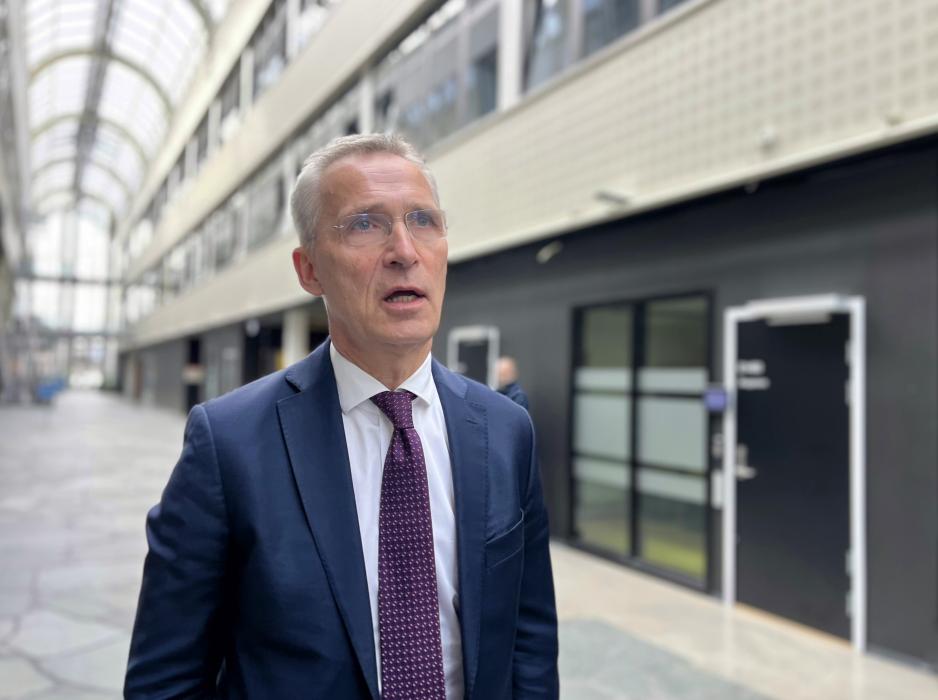Arne O. Holm says Our Time’s Financial “Draft Evaders”

Norway's Minister of Finance, Jens Stoltenberg (Labor), has some hard work ahead of him when he is to finance the future defense expenses. (Photo: Astri Edvardsen)
Comment: The public budgets across Europe are wrought to face Russian aggression and possible American military withdrawal. The wealthy respond by moving to Switzerland. That is how they keep their money to themselves and evade contributing to the defense of Europe.
This is a comment piece written by a member of the editorial staff. All views expressed are the author's own.
In Turkey, NATO's MFAs hold informal meetings, a sort of preliminary skirmish before the summit in the Hague in June. Everything revolves around agreeing on a massive increase in the member countries' defense budgets.
Not close
In advance, NATO chief Mark Rutte has proposed that every NATO country use 3,5 percent of gross domestic product (GDP) on defense and 1,5 on defense materials.
No member of the defense alliance is even close to such a level. Within NATO, it ranges from Poland's just over four percent to Spain's 1,4 percent. Whatever level NATO as an alliance agrees on, we are looking at a colossal increase in defense spending.
Norway has already adopted a long-term plan for its Armed Forces. Until 2036, NOK 1,624 billion will be spent on the Armed Forces. A significant share of this will be used in the North, on the border with Russia. Additionally, allocations to Ukraine will this year end at NOK 85 billion.
In addition to being a lot of money, these are funds to be allocated by politicians who have not yet been elected to the Norwegian parliament. The framework for the Armed Forces' long-term plan is adopted by the current parliament. Future parliaments must take the costs.
More money for defense means less money for civil society.
Fragile construction
Some, myself included, will consider this a fragile construction.
Fragile, first and foremost, because such formidable sums must come from somewhere. Put simply, there will be less for civilian measures when more goes toward military purposes. For Norwegian taxpayers, this is a new and unfamiliar situation. The traditional way to solve problems or conflicts is to increase allocation for almost anything.
Now, expense items such as health, infrastructure, and municipal economy must compete with fighter jets and frigates. The same applies to values such as research and development.
On the same day as the Norwegian government presented its revised national budget, which includes an additional allocation of NOK 50 billion for Ukraine, some of Norway's wealthiest repeated the call to flee Norway in favor of the tax haven, Switzerland.
A new situation for taxpayers.
Get on the plane
Or as the highly profiled stockbroker Jan Petter Wilhelm Courvoisier Sissener said in an op-ed in Nettavisen:
"For all of us creating value in this country, just get on the plane to Switzerland," while also reminding us of what we all know, that many have already moved.
One of the reasons everyone knows this is that some of these tax refugees are regulars in the Norwegian media with their crude criticism of Norwegian policy.
Yet, they are not as vocal about having dined and ditched the bill which is to secure peace in Norway and Europe, fleeing to a country that is rich and has low taxes, not least because they are not part of NATO, and barely spend money on defense.
The newest known numbers show 0,8 percent of the GDP, aiming to reach one percent during the next ten years.
Draft evaders
The neutral Switzerland has built much of its health on this precise neutrality of being able to trade with both the attacked and the belligerent.
I will be careful with characterizations, such as calling Switzerland a security policy freeloader.
The description is nonetheless more fitting for those who have moved from the bill in Norway to Switzerland. Our time's financial "draft evaders."



